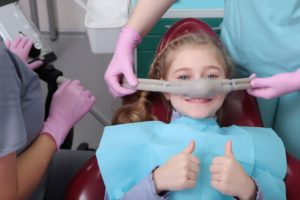
If your child is particularly anxious about visiting the dentist, you might feel tempted to skip their appointments. Unfortunately, this can have a detrimental impact on their oral well-being. It’s important that kids have their first dental visit by the time they’re one year old, and then every 6 months after that. This allows their pediatric dentist to monitor their teeth to ensure they don’t develop any issues in their still-developing mouths.
Many dentists offer sedation options as a result, but is this safe for your little one? Keep reading to learn more about it!
What are the Types of Sedation?
When discussing dental sedatives, there typically are three options. They are:
- Nitrous oxide (laughing gas). This medication is administered in-office once your child arrives for treatment. They’ll wear a small mask over their nose that dispenses a colorless, odorless gas that alleviates worry. They’ll remain conscious the entire time, and the impact wears off almost as soon as the mask is removed.
- Oral conscious sedation. For this method, your kid will be prescribed a pill that you’ll be instructed to give them before bringing them in for their appointment. They’ll be awake for their checkup or procedure but may not remember it afterward. They may be drowsy for several hours afterward, so you may want to keep them at home to recover for the rest of the day.
- IV sedation. This is typically considered the strongest of the options and is administered intravenously. Your child probably won’t remember much of their visit with this technique.
Is Sedation Dentistry Safe for Children?
In general, the medications used for dental sedatives don’t have long-lasting or detrimental impacts on adults or children. That means they’re generally considered safe for most people. That said, there are a few risk factors to be aware of. Your little one might have a greater risk of adverse effects from sedation if they:
- Are 6 years old or younger. Younger kids have a smaller airway that can more easily become blocked.
- Are overweight or obese. If your little one has some extra body weight, they may not metabolize the medication the same way and could have a longer recovery time.
- Are allergic to sedatives. If your child has an allergy, they could respond negatively to the medication.
If you’re worried about the impact of sedation dentistry on your child, be sure to consult with your pediatric dentist or doctor. They’ll be able to answer any questions you have and walk you through the details so that you feel comfortable moving forward.
About the Author
Dr. Meghan Thorburn finds joy in helping children improve their dental health to build happy, healthy smiles. She attended Baylor University for her undergraduate education and then completed dental school and her residency at the University of Texas Houston. She offers multiple forms of sedation to keep your child safe and calm during their next dental procedure. If you’d like an appointment, you’re welcome to request one on the website or by calling (682) 327-1133.
